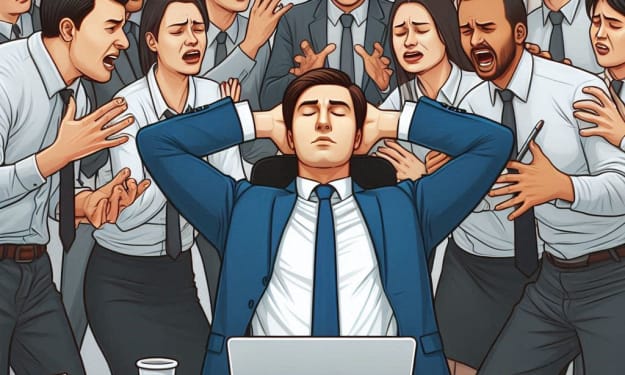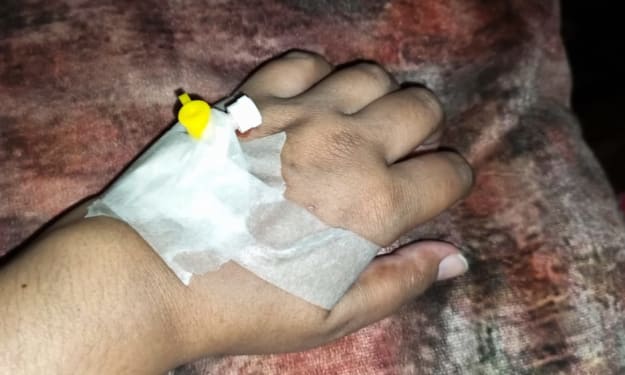Getting Serious
World Mental Health Day 2023

Generally, this platform is my place to play, but today is World Mental Health Day. Which is not to say there isn’t space to be playful when thinking about mental health. Playfulness, after all, is a route to several fundamental protective elements of good mental health – connection, cognitive flexibility, learning and pleasure. But I’m not playing when I say that mental health awareness is important. According to the World Health Organisation, nearly three quarters of a million people die by suicide every year, and this is the tip of the iceberg – the stark, measurable tip. Below the water line people in their millions are impacted by struggles with mental health difficulties, in themselves or those they care about. Most of us, I would say, have a stake in that iceberg. And this is just it – most of us.
Most of us have, or are close to someone who has, difficulties with low mood, eating disorders, addiction, psychosis, personality disorders, trauma symptoms, anxiety in all its many guises. Some of us are brushed in passing, and some bowled over. Some have access to resources, internal or external, that help us get back on our feet, and some stay down. Some of us have never known what it is to BE on our feet, and some get very good at walking with a limp. We are none of us immune or exempt. And this is key, I think, to any discussion about mental health. To struggle with mental health is normal. Human. Expected. And still feared.
It is, of course, also human to fear struggling with mental health. Panic is terrifying, depression so unceasing! But what we do know, is that that fear can make things worse. Panic is a case in point. Those physiological symptoms that help us to escape danger by turning us into superhuman power players, unless we are sprinting off into the distance or going toe to toe with the big bad wolf, feel a bit like we might be dying. Probably a heart attack, maybe some kind of internally generated asphyxiation. And the emotional response is so damn uncomfortable! And so we become afraid of the fear. Next time we brush up against the panic inducing scenario, we become afraid of panicking again. And we are amazing generalisers. So next time we come across any SIMILAR scenario, well – best avoid that, eh? And of course, by avoiding it, we amplify it. We offer ourselves proof that we can’t handle it, that we are incapable, that we are right to be so anxious. And very soon, we find it feels safer to do less, and less, and less. Less of the things that help us to build confidence, to experience pleasure, pride, satisfaction. And in a way, perhaps this is healthy?
“Healthy?” I hear you say. Well let me qualify that. Our brains have one main job. I mean, they can do a lot of cool things, for sure. But the bread and butter, the core work of that magnificent brain, is to keep us alive. Just the same as chimpanzees, dogs, frogs and fish. The first order of business is stay alive. Protect. Survive. And for some of us, survival is a pretty tricky business. Most of us will encounter threat to some degree, but for some, threat has been a pervasive presence in life, or threat has been at one or more points so overwhelming, that survival seemed unlikely. And this isn’t all about being in war zone or a car accident. Let’s hold in mind that we, humans, are a social animal. We depend on our interconnectedness for survival. We are helpless infants, and evolutionarily, pretty hopeless lone wolves. Threat can be about exclusion from the tribe. So where am I getting this healthy notion from? Well, perhaps healthy is the wrong word, adaptive might be better, but when I see someone with ANY mental health difficulty, from mild agoraphobia to people with diagnoses of personality disorder or psychosis, what I see is someone trying to survive. A brain, doing its best, with the tools at its disposal, to survive the shit being thrown at it. To manage.
It is a sad reality that the people who have the most shit thrown at them in their early years, when they are learning about who they are, how it is to be with other humans, how the world is going to treat them, are very often the same people who are given the fewest or bluntest tools. We learn how to care for ourselves by experiencing the care of others, after all. To offer a simple example, if your caregiver hits you instead of hugging you when you make a mistake, not only do you learn to be on the lookout for people hurting you, but you don’t learn how to soothe yourself in safe, sustainable ways. And very often the outcome of putting these survival efforts into practice is that we limit our opportunities to learn new ones. And it is MUCH harder to learn new ones than fall back on the ones that have “worked” so far. These people get a raw deal. It is also often these people who find it hardest to seek help, to be heard, and to make use of help, often facing stigma around diagnosis, and exasperation around their behaviours, behaviours which, when seen through the lens of attempts to survive, make a lot more sense. And yes, sometimes, when survival seems to be costing too much, those attempts may become attempts to remove the pain, to step out of what can feel like a hopeless fight.
And this brings me to the point that I wanted to make here, the thing that I think is important. Well, the two things. Firstly, experiencing difficulties in our mental health is normal. Really, very normal. And secondly, that mental health struggles make sense. Every time. If you know the whole story, EVERY TIME, you can see the sense. And these two points, I think, are key to destigmatising the experience of mental health difficulties. The first is, thankfully, increasingly shouted from the roof tops. But I write this because the fact that mental health difficulties make sense is very much the foundation of them being normal, but that bit is much harder to shout succinctly. But it’s important, because when you can understand the sense, you can learn which tools to put down, and which to try picking up – a hard task, but a hopeful one. And so I am shouting it loud. The question to be asking is never "what is wrong with you?" Its "what happened to you, what have you had to do to protect yourself....and are you still doing it now?" Thank you for listening. And if you, or someone you care for is struggling, hold kindness for that struggle, we are all doing our best.
About the Creator
Enjoyed the story? Support the Creator.
Subscribe for free to receive all their stories in your feed. You could also pledge your support or give them a one-off tip, letting them know you appreciate their work.






Comments (10)
I must have missed this in a flurry of new stories. I apologise for the oversight. This was so good. It's easy to dismiss what can't be seen, isn't it? The British especially and historically like to gloss over stuff. I think if everyone realised that mental health is just like physical health- everyone can receive injury mentally and everyone needs to heal mentally - it would change a pre-established mindset for the better.
Hannah! I love this and appreciate how simple and elegantly you describec everything! as someone with their own mental health issues, married to somone with MH issues and from a family with that history, this was well written and so so important! thank you!
First, let me say, I love the way you wrote this. It had a good pace and for such a serious subject, it made it easier to digest. Second, for me, the way you explained panic attacks was spot on. When I was much younger I put myself and my new bride, through some hell. I'm much better than I was. Thank you so much for writing this.
Great article! I hope it reaches a wider audience.
This felt like it was written for me. I'm a suicide survivor and I struggle with a lot of mental health issues. Reading this felt very reassuring. Thank you so much for writing this!
I’m so glad you wrote this! It’s an important piece, well explained, and needs to be read. Sadly, I know only only too well that everything you say is true. Well done and I hope it gets TS 👍
Excellent article and hope more people see this, hopefully it will be a Top Story
A very important message, very well told. Thank you for shouting it. Just a quick note: "...MUCH harder to learn new ones that fall back on the ones..." I'm thinking you may have meant to type "than." Really a remarkable article, Hannah!
I really appreciate your last paragraph most of all. I've been trying to understand the sense for quite a long time, and you are correct. Once you get the gist of the cause you can start using the correct tools to repair whatever was damaged. I enjoyed the read, and also the fun you have with your word choice (loved this "Just the same as chimpanzees, dogs, frogs and fish.")
So thoughtfully and articulately written but relatable also. Really glad you shared this 🤍